DANCE CLASS
CONTENTS: PAGE 1 | PAGE 2 | PAGE 3 | PAGE 4 | PAGE 5 | PAGE 6
BLACKHORSE LOWE
(writer-director, 5th World):
The biggest discovery I made on my film was what sincerity and truth my parents provided. They played the aunt and uncle in the film. We had shot 15 minutes of footage about them and their experiences meeting one another and falling in love. And originally it wasn’t for the film, but for my own need to know how traditional Navajos went about developing a relationship.
When it came time to edit the film, the fiction that we created was not enough. It was shallow and superficial. It was my parents’ real experience in love and marriage that created a different level that balanced the movie. Through their story I was able to give the movie a lot more truth and realism about cultural values and language. So it is to the both them I thank for showing me the truth in Navajo terms of how to be a better filmmaker and human being. I was able to parallel their true love story with the fictional. So it is to them Fifth World I dedicate; without them I would not be able to create what I have.
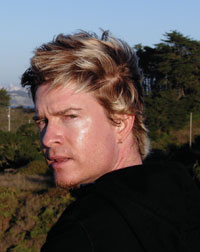 |
| director Scott Coffey |
(writer-director Ellie Parker):
I’ve long had a burning desire that eventually metastasized into a need to capture the essence of what it feels like to live in Los Angeles as struggling artist. For years I’d been subjecting myself to nearly excruciating pain by auditioning for mostly horrible roles in bad films and worse television pilots. I remember sometimes having to bring changes of clothes with me to outfit myself for different auditions.
Also, I was raised in a family of strong woman, and I’ve been really inspired by great movies about women from the ‘70s: Alice Doesn’t Live Here Anymore, An Unmarried Woman, Shoot the Moon, Interiors and Coming Home. Where are these kind of movies now?
So, in early 2000, with these two ideas, and armed with my little one-chip consumer Sony video camera, I convinced my then very un-famous friend Naomi Watts to film a short I’d written a few years earlier. Naomi and I shot the first short, and it came out so great, we continued to shoot scenes over the next four years between Naomi’s acting jobs (suddenly she was one of the biggest movie stars in the world) and my writing. Once I had a few scenes shot and cut, I was amazed and thrilled by how great the short film came out. Suddenly, I’d become a director! My lifetime dream! By actually doing it, I’d done it. I realized that no one was ever going to give me permission or give me the opportunity to do it, and that I just had to do it myself. It was the most liberating thing I’ve ever done. The kind of confidence this realization gave me seeped into my creative process, and it was if a dam broke and ideas have been flooding into my head ever since.
SUSANNE BIER
(director, Brothers):
I always tell myself that a director’s state of mind will not necessarily be influenced by the theme of the film. That it is possible to make a brutal film and yet maintain a light spirit.
However it is not that simple.
In a strange way you are deeply affected. [This state of mind] could be caused by the need to identify with the characters. The only way to portray them is to investigate how they are actually feeling, in good ways and in bad. However it is also what makes it so fascinating to create a film. You get the joy and experience of being in a different world.
It is hardly ever a joyride; often it is painful but always invigorating and exciting.
REBECCA MILLER
(writer-director, The Ballad of Jack & Rose):
The principal thing I learned was the power of shooting in sequence. You get a tremendous emotional build and a deeper understanding of the story and not just for me and the actors; the whole crew was hooked into the story in a much deeper way because it was unfolding before their eyes.”
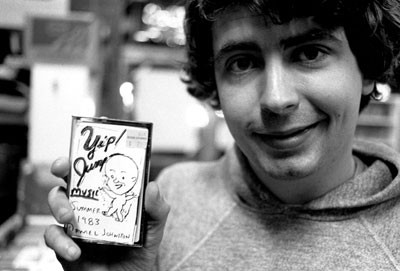 |
| The Devil and Daniel Johnston |
(director, The Devil and Daniel Johnston):
I have always been fascinated with internal monologues where a heightened level of intimacy is achieved and the audience feels closer to the truth. At its best — in films such as Badlands, A Clockwork Orange, Zelig and Taxi Driver — you actually feel like you are inside a character’s head and he/she is talking directly to you without any filters. It was always my dream to be able to use internal monologue in a new and innovative way, and my dream came true when I discovered hundreds of hours of audiocassettes that visionary songwriter and artist Daniel Johnston had recorded of his entire life. At my disposal were childhood arguments with his mother, audio vérité of his high school hallways, surreptitious recordings of his crushed college romance, secret telephone conversations, and — the greatest find of all — an audio letter campaign with his best friend that went on for years and acted essentially as an audio diary.
With literally every key moment of Daniel Johnston’s life and every emotion he felt available to me, I was able to assemble a deeply personal and satisfying narrative that displays Daniel’s essence in all its naked glory. My journey of discovery was to take a ride on the fragile precipice of madness and genius, and Daniel supplied me with the tools to take us there. It was a privilege to have gotten so close to a fire that burns so intensely.
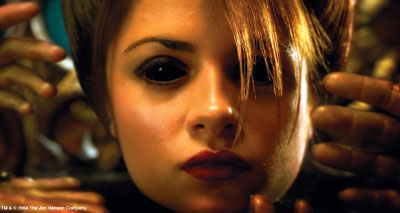 |
| MirrorMask |
(director, MirrorMask):
I would say I learned most about my own strengths and weaknesses. I have a tendency to fall in love with the purity of a formal solution to a problem and then become blind to its possible flaws. Any little changes feel like they are watering down the idea. I think this caused several difficulties on the film, and I think I’ll be conscious of that tunnel vision from now on.
Editing is always a wondrous experience, an alchemical experience. But on this film, working with an editor really for the first time and noticing his approach, continually “on the story” was a big lesson. Any block of dialogue in the script longer than three lines looked suspiciously like fat needed to be trimmed. We cut our penultimate edit, which didn’t have any scenes or large chunks to shed down by ten minutes just by trimming frames and the odd shot. I have no idea where all that fat came from, but it really helped.
I learned that you don’t start up a new computer rendering studio during production. The little blighters need at least three months to get to know each other before an animator goes anywhere near them.
Finally I learned that computers are as human as the rest of us. Our technical director named all the machines after different bands. The four Macs in the edit suite were named after the Beatles. I was John. But then we needed a fifth, and he named it Yoko and they all stopped talking to each other.
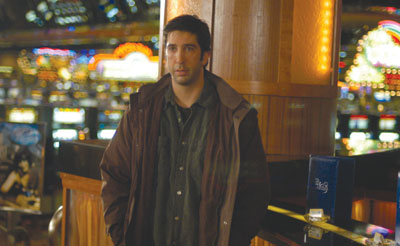 |
| DUANE HOPWOOD |
(writer-director, DUANE HOPWOOD):
I’m not a film geek — I bring having written the script and an ability to work with actors (being one myself) to the table. It’s more “can you drive the car” for me, than “I know how the alternator works.” I’m all for film school, but for me how to convey what you want with a struggling actor is much, much more important than knowing how they did the opening shot in Touch of Evil.
Having said that, I learn bits and pieces as I go along, and one this time was “get two cameras if you can.” The days we had two cameras were the days we made real progress: two set-ups becomes one, and you don’t have to worry about continuity. Actors love to know that when they rev it up —you’re getting it. They hate when the needs or style of the director are an impediment to their work. I’m there to serve the actor — because, in the end, my favorite films are about people, not watching pool balls break in fascinating ways.”
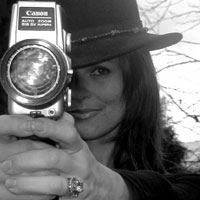
director Heather Rae | HEATHER RAE
(director, Trudell): Trudell was made over a 13-year period, so not only did I make tremendous discoveries, I practically grew up with this movie. Sometimes cinema works in that way — it imbues itself into the maker’s life and consciousness. At a critical point the film pushed me home to Idaho where we finished the project, making me feel like I’m part of an exodus of filmmakers leaving larger urban areas and going back to where they came from. This return deeply influenced the final creative, theoretical and aesthetic process of the filmmaking. I sank into this Western landscape shooting loads of Super 8 (Kodachrome, baby!) and returning to my own Cinematic Manifesto of the Rural. |
GREGG ARAKI
(writer-director, Mysterious Skin):
Prior to Mysterious Skin I’d never adapted anyone else’s material, so that was new for me. I loved Scott Heim’s original novel so much — it’s a dark and challenging story, but so heartfelt, powerful and beautifully told — I knew going in that I wanted the film as true and faithful to Scott’s original vision as possible. Because the voice, tone, narrative structure and characters are all from the book, I found the actual writing of the screenplay to be surprisingly straightforward. It really came down to utilizing cinematic technique — montage, blackouts, voice-over, flashbacks, etc. — to condense 300-plus pages of story into a 99-minute movie. Refining, restructuring, reshaping — very much like editing, only using words and pages instead of shots and an Avid.
And directorially speaking, I had to adapt my style to suit Scott’s story. My primary strategy was to translate the poetic language of the book into a kind of visual/cinematic poetry. Before we began shooting, I sat down with my d.p. and designers and described for them the kind of moody, evocative imagery I was seeking. Our aim was to transform the grimy, mundane, lower middle class milieu of the film via lighting, composition, controlling the color palette, etc. — to create images of incredible pictorial beauty and atmosphere. As a result, the film’s look fits more into the realm of heightened naturalism than my previous work which embraced a more pop expressionist/surrealistic approach.
CONTENTS: PAGE 1 | PAGE 2 | PAGE 3 | PAGE 4 | PAGE 5 | PAGE 6
VOD CALENDAR


 See the VOD Calendar →
See the VOD Calendar →


